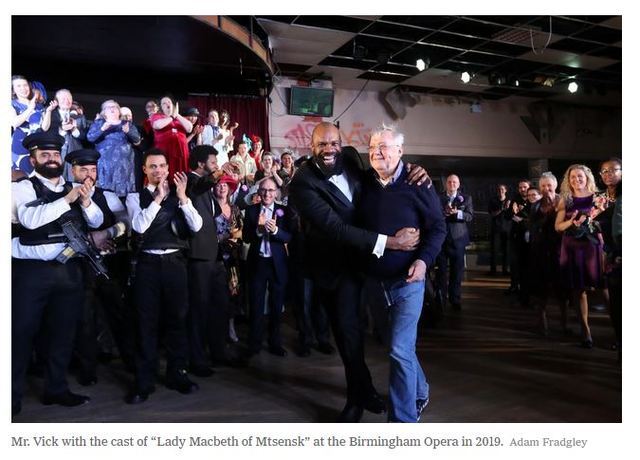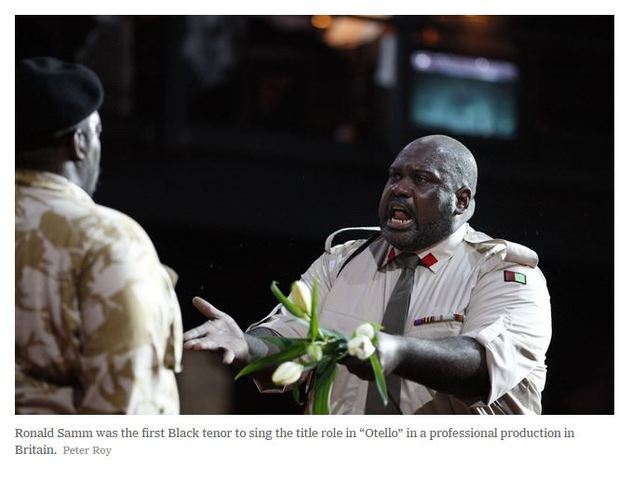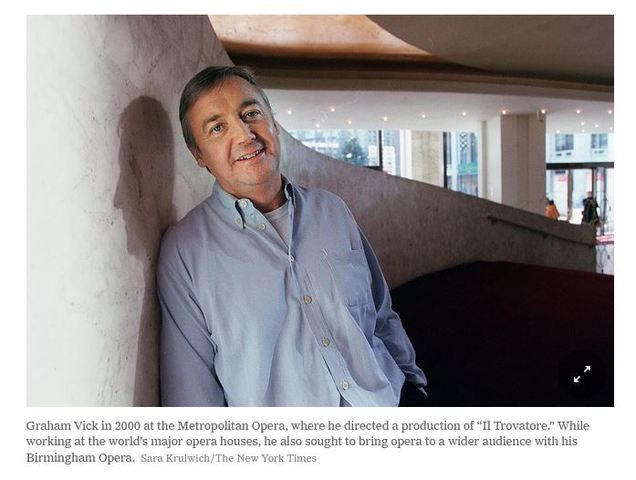Obituary: Leading Opera Director Graham Vick Dies at 67
https://operawire.com/obituary-leading- ... ies-at-67/
I decided to do a search on Vick at the Met. Regards, Len
Search results for: graham vick
36 items found.
Search Results
[Met Performance] CID:318440
Metropolitan Opera Premiere
Lady Macbeth of Mtsensk {1}
Metropolitan Opera House; 11/10/1994
Debuts: Vladimir Galouzine, Dennis Petersen, Vladimir Ognovenko, John Russell, Alexander Anisimov, Graham Vick,
Paul Brown, Nick Chelton, Ron Howell
Review
[Met Performance] CID:331393
Metropolitan Opera Premiere
Moses und Aron {1}
Metropolitan Opera House; 02/08/1999
Debuts: John Tomlinson, Malin Fritz
[Met Performance] CID:331402
Moses und Aron {2}
Metropolitan Opera House; 02/11/1999
[Met Performance] CID:331420
Moses und Aron {3}
Metropolitan Opera House; 02/17/1999
[Met Performance] CID:331429 Opera News 1 Opera News 2
Moses und Aron {4}
Metropolitan Opera House; 02/20/1999
Broadcast
[Met Performance] CID:331438
Moses und Aron {5}
Metropolitan Opera House; 02/23/1999
Review
[Met Performance] CID:331447
Moses und Aron {6}
Metropolitan Opera House; 02/26/1999
[Met Performance] CID:332003
Moses und Aron {7}
Metropolitan Opera House; 09/28/1999
Debut: Roger Andrews
[Met Performance] CID:332012
Moses und Aron {8}
Metropolitan Opera House; 10/1/1999
[Met Performance] CID:332030
Moses und Aron {9}
Metropolitan Opera House; 10/7/1999
[Met Performance] CID:332492
Lady Macbeth of Mtsensk {10}
Metropolitan Opera House; 03/9/2000
Debut: Grigori Karasev, Gennady Bezzubenkov
[Met Performance] CID:332507
Lady Macbeth of Mtsensk {11}
Metropolitan Opera House; 03/14/2000
[Met Performance] CID:332519
Lady Macbeth of Mtsensk {12}
Metropolitan Opera House; 03/18/2000
Broadcast
[Met Performance] CID:332528
Lady Macbeth of Mtsensk {13}
Metropolitan Opera House; 03/21/2000
[Met Performance] CID:332543
Lady Macbeth of Mtsensk {14}
Metropolitan Opera House; 03/25/2000
[Met Performance] CID:332555
Lady Macbeth of Mtsensk {15}
Metropolitan Opera House; 03/30/2000
[Met Performance] CID:333225
New Production
Il Trovatore {572}
Metropolitan Opera House; 12/7/2000
Debuts: David Lowe, John Shelhart, Matthew Richardson
[Met Performance] CID:333237
Il Trovatore {573}
Metropolitan Opera House; 12/11/2000
[Met Performance] CID:333249
Il Trovatore {574}
Metropolitan Opera House; 12/15/2000
[Met Performance] CID:333267
Il Trovatore {575}
Metropolitan Opera House; 12/21/2000
[Met Performance] CID:333279
Il Trovatore {576}
Metropolitan Opera House; 12/26/2000
[Met Performance] CID:333288
Il Trovatore {577}
Metropolitan Opera House; 12/29/2000
[Met Performance] CID:333300
Il Trovatore {578}
Metropolitan Opera House; 01/2/2001
[Met Performance] CID:333315
Il Trovatore {579}
Metropolitan Opera House; 01/6/2001
[Met Performance] CID:333321
Il Trovatore {580}
Metropolitan Opera House; 01/9/2001
Debut: Francisco Casanova
[Met Performance] CID:333333 Opera News 1 Opera News 2
Il Trovatore {581}
Metropolitan Opera House; 01/13/2001
Broadcast
[Met Performance] CID:333549
Il Trovatore {582}
Metropolitan Opera House; 03/22/2001
[Met Performance] CID:350846
Moses und Aron {10}
Metropolitan Opera House; 12/16/2003
Debut: Jennifer Hines
[Met Performance] CID:350851 Opera News 1 Opera News
Moses und Aron {11}
Metropolitan Opera House; 12/20/2003
Broadcast
[Met Performance] CID:350854
Moses und Aron {12}
Metropolitan Opera House; 12/23/2003
[Met Performance] CID:355616
Lady Macbeth of Mtsensk {16}
Metropolitan Opera House; 11/10/2014
Debut: Mikhail Kolelishvili
Broadcast/Streamed
[Met Performance] CID:355623
Lady Macbeth of Mtsensk {17}
Metropolitan Opera House; 11/13/2014
[Met Performance] CID:355630
Lady Macbeth of Mtsensk {18}
Metropolitan Opera House; 11/17/2014
[Met Performance] CID:355642
Lady Macbeth of Mtsensk {19}
Metropolitan Opera House; 11/21/2014
[Met Performance] CID:355651
Lady Macbeth of Mtsensk {20}
Metropolitan Opera House; 11/25/2014
Broadcast
[Met Performance] CID:355659
Lady Macbeth of Mtsensk {21}
Metropolitan Opera House; 11/29/2014
Leading Opera Director Graham Vick Dies at 67
-
lennygoran
- Posts: 19347
- Joined: Tue Mar 27, 2007 9:28 pm
- Location: new york city
-
lennygoran
- Posts: 19347
- Joined: Tue Mar 27, 2007 9:28 pm
- Location: new york city
Re: Leading Opera Director Graham Vick Dies at 67
The NY Times has now posted this article on Vick. Regards, Len
Graham Vick, Director Who Opened Opera’s Doors, Dies at 67
The British director was no stranger to the prestige houses, but his calls to make opera more inclusive and available to everyone eventually found their moment.



By Alex Marshall
July 19, 2021
LONDON — Graham Vick, a British opera director who worked at prestigious houses like the Metropolitan Opera and La Scala while also seeking to broaden opera’s appeal by staging works in abandoned rock clubs and former factories and by bringing more diversity to casting, died on Saturday in London. He was 67.
The cause was complications of Covid-19, the Birmingham Opera Company, which he founded, said in a news release.
Those We’ve Lost
Read about other people who have died in the coronavirus pandemic here.
Mr. Vick spent much of the coronavirus pandemic in Crete, Greece, and returned to Britain in June to take part in rehearsals for a Birmingham Opera production of Wagner’s “Das Rhinegold,” Jonathan Groves, his agent, said in a telephone interview.
Mr. Vick was artistic director at the company, which he saw as a vehicle to bring opera to everyone. His productions there, which were in English, often included amateur performers. And he insisted on keeping ticket prices low so that anyone could attend, and on hiring singers who reflected the ethnic diversity of Birmingham, Britain’s second largest city. His immersive production of Verdi’s “Otello” in 2009 featured Ronald Samm, the first Black tenor to sing the title role in a professional production in Britain.
“You do not need to be educated to be touched, to be moved and excited by opera,” he said in a speech at the Royal Philharmonic Society Music Awards in 2016. “You only need to experience it directly at first hand, with nothing getting in the way.”
Opera makers must “remove the barriers and make the connections that will release its power for everybody,” he added.
Oliver Mears, the Royal Opera House’s director of opera, said in a statement that Mr. Vick had been “a true innovator in the way he integrated community work into our art form.”
“Many people from hugely diverse backgrounds love opera — and first experienced it — through his work,” he said.
Graham Vick was born on Dec. 30, 1953, in Birkenhead, near Liverpool. His father, Arnold, worked in a clothing store, while his mother Muriel (Hynes) Vick worked in the personnel department of a factory. His love of the stage bloomed at age 5 when he saw a production of “Peter Pan.”
“It was a complete road-to-Damascus moment,” he told The Times of London in 2014. “Everything was there — the flight through the window into another world, a bigger world.”
Opera gave him similar opportunities to “fly, soar, breathe and scream,” he said.
Mr. Vick studied at the Royal Northern College of Music in Manchester, England, intending to become a conductor. But he turned to directing and created his first production at 22. Two years later, he directed a production of Gustav Holst’s “Savitri” for Scottish Opera and soon became its director of productions.
With Scottish Opera, he quickly showed his desire to bring opera to local communities. He led Opera-Go-Round, an initiative in which a small troupe traveled to remote parts of Scotland’s Highlands and islands, often performing with just piano accompaniment. He also brought opera singers to factories to perform during lunch breaks.
Mr. Vick became director of productions at the Glyndebourne Festival in 1994. That same year he made his debut at the Metropolitan Opera with a raucous staging of Shostakovich’s “Lady Macbeth of Mtsensk,” the first time the company performed the opera. He also directed Schoenberg’s “Moses und Aron” and “Il Trovatore” at the Met.
Anthony Tommasini of The New York Times called Mr. Vick’s “Moses und Aron” “a starkly modern yet poignantly human staging.”
Mr. Vick put on his first production at La Scala in Milan in 1996, directing Luciano Berio’s “Outis.” In 1999, after a multiyear renovation and expansion, he reopened London’s Royal Opera House with Verdi’s “Falstaff.”
Some of his productions received mixed or even harsh reviews. “Stalin was right,” Edward Rothstein wrote in The Times in reviewing “Lady Macbeth of Mtsensk” in 1994, calling Mr. Vick’s production “crude, primitive, vulgar,” just as Stalin had done with Shostakovich’s original. Just as often they were praised, however.
Despite Mr. Vick’s success at traditional opera houses, he sometimes criticized them. “They’re huge, glamorous, fabulous, seductive institutions, but they’re also a dangerous black hole where great art can so easily become self-serving product,” he told the BBC in 2012.
Mr. Vick’s work at the Birmingham Opera Company, which he founded in 1987, was celebrated in Britain for its bold vision. Its first production, another “Falstaff,” was staged inside a recreation center in the city; other productions took place in a burned-out ballroom above a shopping center and in an abandoned warehouse.
Mr. Vick decided to use amateurs after rehearsing a Rossini opera in Pesaro, Italy, in the 1990s. It was so hot and airless one day, he recalled in a 2003 lecture, that he opened the theater’s doors to the street and was shocked to see a group of teenagers stop their soccer game and watch, transfixed.
“To reach this kind of constituency in Birmingham, we decided to recruit members of the community into our work,” he said. People who bought tickets should see reflections of themselves onstage and in the production team, he added.
Mr. Vick kept returning to Birmingham because, he said, it was only there, “in the glorious participation of audience and performers,” that he felt whole.
The company was praised not only for its inclusivity. Its 2009 staging of “Otello” “gets you in the heart and the guts,” Rian Evans wrote in The Guardian. And Mark Swed, in The Los Angeles Times, called Mr. Vick’s production of Karlheinz Stockhausen’s “Mittwoch aus Licht” in 2012 “otherworldly.” (It included string players performing in helicopters and a camel, and was part of Britain’s 2012 Olympic Games celebrations.)
“If opera is meant to change your perception of what is possible and worthwhile, to dream the impossible dream and all that, then this is clearly the spiritually uplifting way to do it,” Mr. Swed added.
Mr. Vick, who died in a hospital, is survived by his partner, the choreographer Ron Howell, as well as an older brother, Hedley.
In his speech at the Royal Philharmonic Society awards, Mr. Vick urged those in the opera world to “get out of our ghetto” and follow the Birmingham example in trying to reflect the community where a company is based.
People need to “embrace the future and help build a world we want to live in,” he said, “not hide away fiddling while Rome burns.”
https://www.nytimes.com/2021/07/19/arts ... -dead.html
Graham Vick, Director Who Opened Opera’s Doors, Dies at 67
The British director was no stranger to the prestige houses, but his calls to make opera more inclusive and available to everyone eventually found their moment.



By Alex Marshall
July 19, 2021
LONDON — Graham Vick, a British opera director who worked at prestigious houses like the Metropolitan Opera and La Scala while also seeking to broaden opera’s appeal by staging works in abandoned rock clubs and former factories and by bringing more diversity to casting, died on Saturday in London. He was 67.
The cause was complications of Covid-19, the Birmingham Opera Company, which he founded, said in a news release.
Those We’ve Lost
Read about other people who have died in the coronavirus pandemic here.
Mr. Vick spent much of the coronavirus pandemic in Crete, Greece, and returned to Britain in June to take part in rehearsals for a Birmingham Opera production of Wagner’s “Das Rhinegold,” Jonathan Groves, his agent, said in a telephone interview.
Mr. Vick was artistic director at the company, which he saw as a vehicle to bring opera to everyone. His productions there, which were in English, often included amateur performers. And he insisted on keeping ticket prices low so that anyone could attend, and on hiring singers who reflected the ethnic diversity of Birmingham, Britain’s second largest city. His immersive production of Verdi’s “Otello” in 2009 featured Ronald Samm, the first Black tenor to sing the title role in a professional production in Britain.
“You do not need to be educated to be touched, to be moved and excited by opera,” he said in a speech at the Royal Philharmonic Society Music Awards in 2016. “You only need to experience it directly at first hand, with nothing getting in the way.”
Opera makers must “remove the barriers and make the connections that will release its power for everybody,” he added.
Oliver Mears, the Royal Opera House’s director of opera, said in a statement that Mr. Vick had been “a true innovator in the way he integrated community work into our art form.”
“Many people from hugely diverse backgrounds love opera — and first experienced it — through his work,” he said.
Graham Vick was born on Dec. 30, 1953, in Birkenhead, near Liverpool. His father, Arnold, worked in a clothing store, while his mother Muriel (Hynes) Vick worked in the personnel department of a factory. His love of the stage bloomed at age 5 when he saw a production of “Peter Pan.”
“It was a complete road-to-Damascus moment,” he told The Times of London in 2014. “Everything was there — the flight through the window into another world, a bigger world.”
Opera gave him similar opportunities to “fly, soar, breathe and scream,” he said.
Mr. Vick studied at the Royal Northern College of Music in Manchester, England, intending to become a conductor. But he turned to directing and created his first production at 22. Two years later, he directed a production of Gustav Holst’s “Savitri” for Scottish Opera and soon became its director of productions.
With Scottish Opera, he quickly showed his desire to bring opera to local communities. He led Opera-Go-Round, an initiative in which a small troupe traveled to remote parts of Scotland’s Highlands and islands, often performing with just piano accompaniment. He also brought opera singers to factories to perform during lunch breaks.
Mr. Vick became director of productions at the Glyndebourne Festival in 1994. That same year he made his debut at the Metropolitan Opera with a raucous staging of Shostakovich’s “Lady Macbeth of Mtsensk,” the first time the company performed the opera. He also directed Schoenberg’s “Moses und Aron” and “Il Trovatore” at the Met.
Anthony Tommasini of The New York Times called Mr. Vick’s “Moses und Aron” “a starkly modern yet poignantly human staging.”
Mr. Vick put on his first production at La Scala in Milan in 1996, directing Luciano Berio’s “Outis.” In 1999, after a multiyear renovation and expansion, he reopened London’s Royal Opera House with Verdi’s “Falstaff.”
Some of his productions received mixed or even harsh reviews. “Stalin was right,” Edward Rothstein wrote in The Times in reviewing “Lady Macbeth of Mtsensk” in 1994, calling Mr. Vick’s production “crude, primitive, vulgar,” just as Stalin had done with Shostakovich’s original. Just as often they were praised, however.
Despite Mr. Vick’s success at traditional opera houses, he sometimes criticized them. “They’re huge, glamorous, fabulous, seductive institutions, but they’re also a dangerous black hole where great art can so easily become self-serving product,” he told the BBC in 2012.
Mr. Vick’s work at the Birmingham Opera Company, which he founded in 1987, was celebrated in Britain for its bold vision. Its first production, another “Falstaff,” was staged inside a recreation center in the city; other productions took place in a burned-out ballroom above a shopping center and in an abandoned warehouse.
Mr. Vick decided to use amateurs after rehearsing a Rossini opera in Pesaro, Italy, in the 1990s. It was so hot and airless one day, he recalled in a 2003 lecture, that he opened the theater’s doors to the street and was shocked to see a group of teenagers stop their soccer game and watch, transfixed.
“To reach this kind of constituency in Birmingham, we decided to recruit members of the community into our work,” he said. People who bought tickets should see reflections of themselves onstage and in the production team, he added.
Mr. Vick kept returning to Birmingham because, he said, it was only there, “in the glorious participation of audience and performers,” that he felt whole.
The company was praised not only for its inclusivity. Its 2009 staging of “Otello” “gets you in the heart and the guts,” Rian Evans wrote in The Guardian. And Mark Swed, in The Los Angeles Times, called Mr. Vick’s production of Karlheinz Stockhausen’s “Mittwoch aus Licht” in 2012 “otherworldly.” (It included string players performing in helicopters and a camel, and was part of Britain’s 2012 Olympic Games celebrations.)
“If opera is meant to change your perception of what is possible and worthwhile, to dream the impossible dream and all that, then this is clearly the spiritually uplifting way to do it,” Mr. Swed added.
Mr. Vick, who died in a hospital, is survived by his partner, the choreographer Ron Howell, as well as an older brother, Hedley.
In his speech at the Royal Philharmonic Society awards, Mr. Vick urged those in the opera world to “get out of our ghetto” and follow the Birmingham example in trying to reflect the community where a company is based.
People need to “embrace the future and help build a world we want to live in,” he said, “not hide away fiddling while Rome burns.”
https://www.nytimes.com/2021/07/19/arts ... -dead.html
Who is online
Users browsing this forum: No registered users and 30 guests